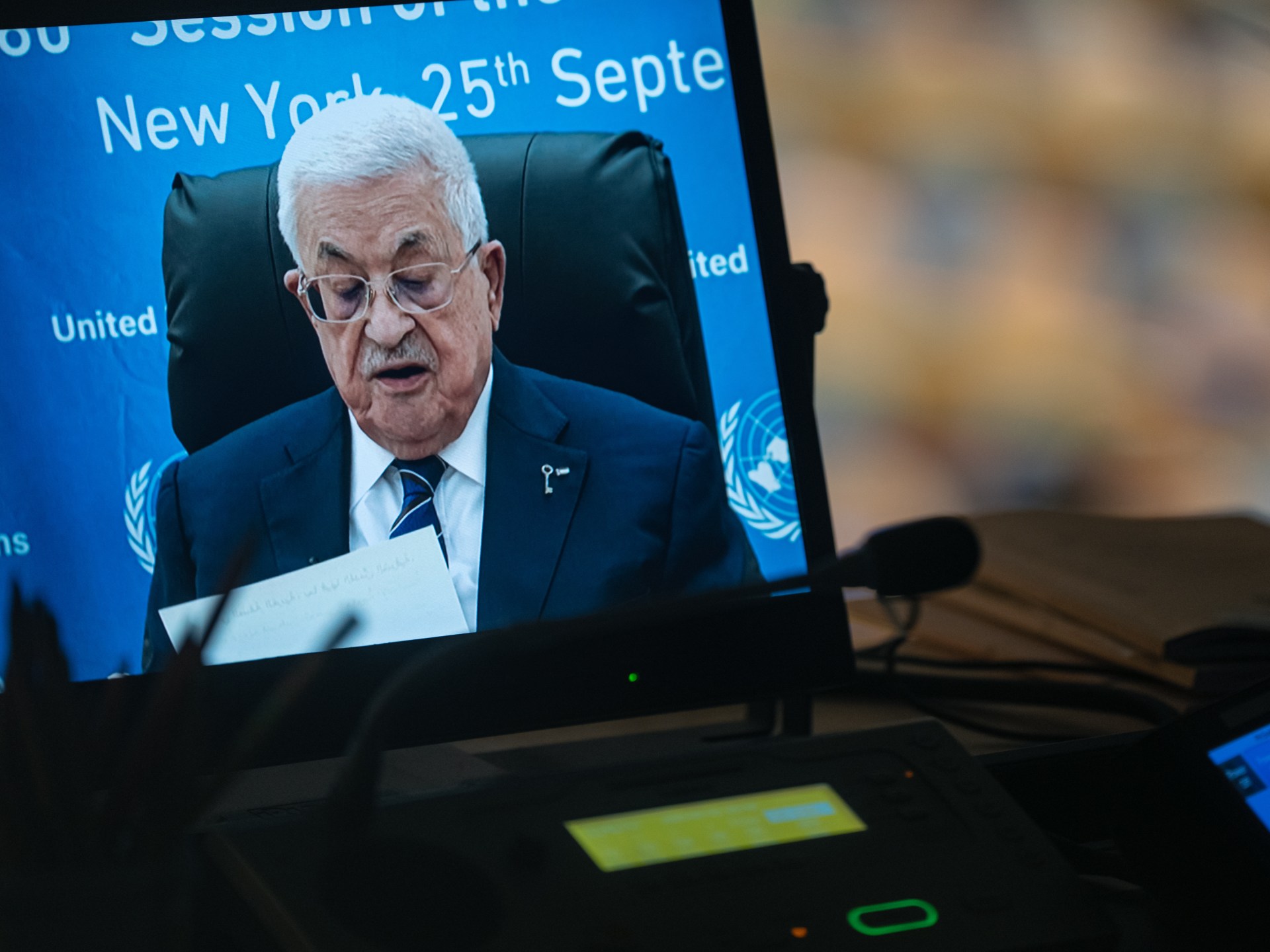Palestinian Authority President Mahmoud Abbas has decried Israel’s use of starvation as a weapon, calling out “the extremist Israeli government” for its continued settlement projects that make a future Palestinian state virtually impossible.
The 89-year-old addressed world leaders gathered for the United Nations General Assembly via videolink on Thursday after being refused a visa by the United States to travel to New York.
Recommended Stories
list of 3 itemsend of list
“I speak to you today after almost two years in which our Palestinian people in the Gaza Strip have been facing a war of genocide, destruction, starvation and displacement,” Abbas said.
Addressing genocide
The Palestinian leader began his speech by denouncing Israel’s genocidal war in Gaza, which has killed at least 65,419 people and wounded 167,160 since October 2023, according to local health authorities. Thousands more are believed to be buried under the rubble of homes and office buildings devastated by Israeli air strikes.
A total of 1,139 people were killed in Israel during the Hamas-led October 7, 2023, attacks, and roughly 200 were taken captive to Gaza.
“What Israel is carrying out is not merely an aggression,” Abbas said.
“It is a war crime and a crime against humanity that is both documented and monitored, and it will be recorded in history books and the pages of international conscience as one of the most horrific chapters of humanitarian tragedy in the 20th and 21st centuries.”
The UN outlined Israel’s plans to destroy life in Gaza in a report released on Tuesday, which found that Israeli forces have “systematically destroyed” civilian life across Gaza over the past two years.
“Since October 2023, Israeli officials have demonstrated a clear and consistent intent to establish permanent military control over Gaza and to change its demographic composition while systematically destroying Palestinian life in Gaza,” the report said. It cited Israeli demolition of wells, sewage-pumping stations and wastewater treatment plants as well as the destruction of educational institutions, mosques and cemeteries.
Last week, a UN inquiry found that Israel’s war on Gaza is a genocide, a landmark moment after nearly two years of conflict that critics have called a war of vengeance without any specific goals.
Israel’s assault on Gaza intensified this week with at least 85 Palestinians killed across the territory on Wednesday.
No role for Hamas
Despite the ongoing hostilities, Abbas was clear about Hamas. He soundly rejected the group’s actions on October 7, 2023, saying the targeting of civilians and taking of captives does “not represent the Palestinian people, nor do they represent their just struggle for freedom and independence”.
Abbas insisted “Hamas will not have a role to play in governance,” saying Hamas and other factions will have to hand over their weapons as part of a state-building process.
Israel’s illegal settlements
Abbas turned his attention to Israel’s settlements in the occupied West Bank, which are illegal under international law. He said: “The extremist Israeli government continues to implement its settlement disease through illegal settlement expansion and developing projects for annexing settlements.”
Israeli Prime Minister Benjamin Netanyahu moved forward last week with a settlement expansion plan in the West Bank that would make any future Palestinian state virtually impossible.
The Israeli leader signed an agreement to move forward with the project, which would bisect the West Bank, saying he was fulfilling his promise that “there will be no Palestinian state”.
Abbas called this plan “a blatant violation of international law and relevant Security Council resolutions”.
“Our people in the West Bank, including East Jerusalem, and in the Gaza Strip, are still living through the tragedies of the Israeli aggression and occupation for decades,” Abbas said in his speech. “Years that our people have spent under occupation, killing, arrests and settlement and the theft of money, property and lands, and this still continues without any deterrent or accountability.”
While concluding his speech, Abbas outlined several of the Palestinian Authority’s positions, including the need for an immediate and permanent end to the war in Gaza, the release of all captives and prisoners on both sides, and the need for a guarantee that residents of the Gaza Strip will be able to remain on their lands without displacement.
“No matter how much our wounds bleed and no matter how long this suffering lasts, it will not break our will to live and survive,” Abbas said at the end of his speech.
Where do negotiations go from here?
Abbas was careful not to criticise the US government, but notably, he was not in attendance in New York.
“What’s interesting is that there’s really active diplomacy going on here, and Palestine is not present for that either,” Al Jazeera’s James Bays said after Abbas’s address, referring to a meeting this week between US President Donald Trump and Arab and Muslim leaders. From that meeting came a 21-point peace plan presented by Trump that includes a provision to stop Netanyahu from full annexation of the West Bank, Bays reported, quoting US special envoy Steve Witkoff.
While this may be a notable step forward, it is a step that was negotiated without Abbas.
“It is a plan that has been negotiated without the Palestinian Authority. Is the Palestinian Authority, under the Trump plan, going to play a role in the future of Gaza and, for that matter, the West Bank?” Bays said on Thursday from UN headquarters in New York.
Martin Griffiths, director of the Mediation Group International and a former top UN official, told Al Jazeera it’s ominous that no Palestinians appear to have been consulted about the proposal.
“I think it was very telling that in the Steve Witkoff comments, he made no mention of the Palestinians. I mean that is a red light, in my view, if you don’t include the people under consideration, and it tells us something profound about the possible plan,” Griffiths said.
